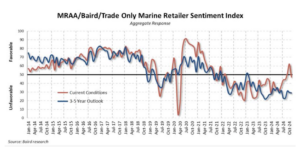
The number of families earning more than $100,000 a year that are unable to afford purchasing homes is on the rise, The Wall Street Journal reported last week.
About 19 percent of U.S. households with six-figure incomes rented homes this year, up from about 12 percent in 2006, according to a Wall Street Journal analysis of Census Bureau data that adjusted incomes for inflation.
“I can’t think of anyone we’ve rented to recently who didn’t make $100,000,” Bruce McNeilage, who owns 148 rental homes in the Southeast and is building 118 more, told WSJ.
Because nearly all boat owners also own homes, that could have implications for the marine industry, said Jack Ellis, co-founder of Info-Link, a Florida firm that tracks boat registrations.
First-time buyers comprised 33 percent of all home buyers in 2018, a slight decrease from 2017, when the number was 34 percent, according to the National Association of Realtors. The historical norm is 40 percent.
In 1981, the share of first-time buyers was 44 percent. In 1987, the number fell to an all-time low of 30 percent but increased to 44 percent in 1991. The share remained between 40 and 42 percent from 1993 to 2005 until it took a dip in 2006 to 36 percent.
The typical buyer was 46 years old in 2018, and the median household income was $91,600.That tracks with today’s average boat buyer, who is about 45, because it takes that long to accumulate the wealth and equity necessary to afford a boat, Ellis told Trade Only Today.
“One of the key demographics among boat owners is that most of them own a home — probably about 90 percent of them,” Ellis said, adding that this is true for first-time boat buyers, as well as repeat buyers.
“It makes sense,” he said. “You need a place to put a boat. It’s easier to store a boat at home than an apartment. If you’re borrowing money for the boat, I’m of the opinion of, lenders don’t like to lend to people they can’t find. Also, people need to feel they’re settled in before buying toys.”
Half of all home buyers in 2018 said it was difficult to save for a down payment because of student loans — another possible implication for people who might buy boats. Another 37 percent said credit card debt made saving for a down payment challenging, and 35 percent pointed to car loans, according to NAR.
Delays in home ownership, particularly first-time buyers, also stands to impact the number of boat buyers, said Ellis.
“In fact, when we looked at it, not only are boat owners homeowners, they’ve typically lived in the house a number of years,” he said. “It’s not like they say, I finally bought a house, now I can turn around and buy the boat.”
As more people forgo home ownership, there is a risk that America’s wealth gap will worsen, wrote The Wall Street Journal.
Home-value appreciation has been the way many middle-class Americans accumulate wealth. When real-estate values rose steadily in the decades after World War II, middle-class wealth surged, according to a new analysis of consumer survey data from the University of Michigan dating to the late 1940s.
The accumulation of net worth is probably at least part of the reason there’s a correlation between home ownership and boat ownership, Ellis said. Boat owners typically make between $50,000 and $150,000 a year, averaging a bit above average at $64,000.
“They’re better off than average, but it’s not like boat owners are typically all that wealthy,” Ellis said. “However, we found they have accumulated quite a bit more net worth — about four times higher than the national average — and some of that, of course, is equity in the home. One definitely leads to another.”












